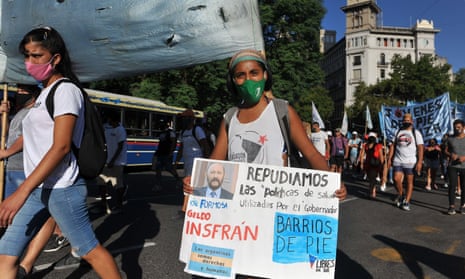The Argentinian province with the lowest Covid death rate in the country has been accused by human rights groups of forcibly quarantining thousands of people under inhuman conditions to achieve that result.
More than 21,000 people have been held in compulsory quarantine in the northern province of Formosa. One thousand, one hundred and fifty-seven are still being held, despite there only being 60 active cases in the province, according to Formosa’s own figures.
“This arbitrary detention under the blanket of sanitary policy is not only illegal but a flagrant violation of human rights,” said the head of Amnesty International in Argentina, Mariela Belski.
Many have been held for more than the recommended two weeks, sometimes up to 30 days, under constant police surveillance, without being informed of their test results, say human rights campaigners, who describe an abusive panorama of overcrowding, arbitrary arrests, unsanitary conditions and heavy police control of those under quarantine.
“We have heard of cases of people undergoing high levels of psychological and physical suffering derived from their compulsory detention under inhuman conditions,” Belski said.
“No government or political party owns human rights, and they should all be open to criticism, especial for grave abuses as those reported in Formosa,” tweeted the Human Rights Watch director, José Miguel Vivanco.
Anyone who tests positive for coronavirus, and others considered to be a “contagion risk” – even if they have not tested positive – must undergo compulsory quarantining in “sanitary attention centres” (CAS in their Spanish acronym). Those undergoing compulsory incarceration are crowded together in a manner that expose non-positive persons to contagion, say human rights groups.
Such measures have arguably helped Peronist-run Formosa secure the lowest Covid death rate of Argentina’s 24 provinces, registering only two deaths per 100,000 inhabitants.
At the other end of the scale, the city of Buenos Aires, one of only four governorships held by the opposition centre-right Juntos por el Cambio coalition, has registered 192 deaths per 100,000, far above the national average of 107.
But Formosa’s statistics have come at a severe price for the thousands of people held in its police-managed quarantine centers.
The province’s lockdown has been so extreme that it has closed its borders to the rest of Argentina. Arrivals who test positive are not allowed entry, while those who test negative are held in provincial quarantine centers under unhygienic conditions that often result in contagion.
The result last year was an estimated 8,500 residents who have not been able to re-enter the province, even after a supreme court ruling ordering their readmission. In December, the province said it had allowed 2,774 to re-enter but many others have been left stranded by the roadside without any provincial or national assistance, say
campaigners.
One 23-year-old man drowned trying to swim across the Bermejo river to re-enter the province.
For the past 26 years, Formosa has been under the rule of a single governor, Gildo Insfrán, from the same Peronist party as President Alberto Fernández, who has been accused by the opposition of turning a blind eye to Insfrán’s alleged human rights violations.
As elsewhere, attitudes towards the pandemic in Argentina reflect political divisions, with the progressive Peronist party in favour of tight controls while Juntos por el Cambio argues for a return to classes and the elimination of other quarantine restrictions.
A delegation of legislators from the opposition party arrived in Formosa on Thursday to verify the reports of human rights violations.
Formosa, meanwhile, points to its Covid record to justify its draconian sanitary measures, saying the criticism mostly comes from Juntos por el Cambio, whose main luminary, the mayor of Buenos Aires, Horacio Rodríguez Larreta, is a presidential hopeful for the 2023 elections.
“Rodríguez Larreta has the worst management of the pandemic in the country,” said the Formosa human development minister, Aníbal Gómez, pointing at the disproportionately high Covid death rate in Buenos Aires.
Argentina has an accumulated total of almost 2m cases and 48,000 deaths so far, with a population of about 45 million.
